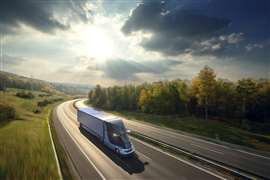Street Smarts: Glimpse at Trucking’s Future Comes to Florida’s Roads
17 January 2024
 The Terraline Tangra semi truck. (Illustration: Terraline)
The Terraline Tangra semi truck. (Illustration: Terraline)
There are two common – and legitimate – concerns about electric truck technology that I hear all the time. The first are questions about range, and the second is recharging times.
Both issues are worrisome for fleets, and rightly so. Though to be honest, I think range anxiety is slowly becoming less of an issue as fleets gain experience with electric trucks. In pragmatic terms, limited range is what it is. And, assuming you have a route that the truck can handle, it’s turning out to be really not that big a deal.
Charging times are harder to get a read on. For starters, they’re all over the place, depending on a wide range of factors like charging system output, availability charging and the battery setup on a truck to name a few. But there is still no way around the fact that even in best-case scenarios, it takes significantly longer to charge the batteries on most electric trucks than it does to fill a tank with diesel fuel. That’s a problem for human drivers with set routes, expectant customers and Hours of Service rules to conform to – not to mention families waiting at home.
But you know who – or what, to be more precise – doesn’t care about electric truck recharging times? The autonomous control system on a self-driving truck, that’s who.
Clean-sheet high-tech designs
Up until now, we’ve been in the early stages of what is clearly going to be a dramatic/transformative/disruptive period in trucking that will completely reshape every aspect of this industry. Most of the new battery-electric/alternative fuel and autonomous technology we’ve seen to this point has been back-engineered onto existing vehicle platforms. This makes perfect sense from a research and development/cost control perspective.
But we are already starting to see all-new vehicle designs conceived from the get-go to take advantage of these rapidly developing new technologies. The Terraline EV500 is a perfect example of this new approach.
Terraline calls its EV500 the industry’s first clean-sheet, battery-electric Class 8 long-haul truck. Even better, it says the new truck features more than a 500-mile range on a single battery charge. Significantly, it is an autonomous-ready commercial vehicle platform. In other words, full driverless capability was a foundational aspect of the truck’s design.
Hitting the road
Now, the Terraline EV500 is getting some real-world experience hauling freight. The company has partnered with Crowley, a global supply chain company, to test the truck beginning this year and continuing into 2026.
Under the terms of the agreement, EV500 trucks will haul freight between Crowley freight terminals in Fort Lauderdale, Miami and Jacksonville, Fla. Crowley will have a formal option to order production models from Terraline in 2026 when the trial runs conclude.
“Change is coming to freight logistics at an incredible pace, and it’s an industry imperative to serve that growth sustainably,” said Graham Doorley, CEO and founder, Terraline. “We have enormous goals around accelerating the adoption of electrification across freight fleets. Securing this agreement with such a forward-looking company like Crowley validates our team’s hard work and gets the industry closer to meeting state and federal emissions mandates. Crowley’s commitment to integrating Terraline trucks into its fleet strongly endorses our approach to rethinking trucking for the next century.”
 Jack Roberts is a Tuscaloosa, Ala.-based independent journalist and licensed commercial driver with more than 20 years’ experience covering the North American and global trucking industries.
Jack Roberts is a Tuscaloosa, Ala.-based independent journalist and licensed commercial driver with more than 20 years’ experience covering the North American and global trucking industries.
As Terraline’s first U.S. partner, the test runs with Crowley will provide valuable insight into the truck’s performance and enable the OEM to continue the evolution of the technology throughout development. Zero-emission trucks provided by Terraline will also help inform lower-emission electrification improvements underway in Crowley’s terminals and other facilities, including on-site equipment, according to Bob Weist, vice president, North American transportation for Crowley.
“Each day, Crowley works to become the most sustainable and innovative logistics company in the Americas as we grow our solutions that serve our customers and help our communities,” Weist noted. “Partnering with Terraline for this pilot project can advance our progress to reach net-zero across all of our scopes and operations. Innovation is happening fast in our industry to meet our customers’ increasing demand for transformational technologies like Terraline’s.”
For now, it appears the focus of the EV500 trial runs will be on validating the battery-electric drivetrain’s ability to handle real-world freight operations, with a clear emphasis on emissions reductions and pioneering viable green transportation practices. My guess, based on countless other electric truck trials being conducted around the country, is that those tests will go well. So, it will be interesting to see if Crowley decides to move forward and take advantage of the EV500’s built-in autonomous capabilities and add them to future cargo runs.
STAY CONNECTED



Receive the information you need when you need it through our world-leading magazines, newsletters and daily briefings.
CONNECT WITH THE TEAM





